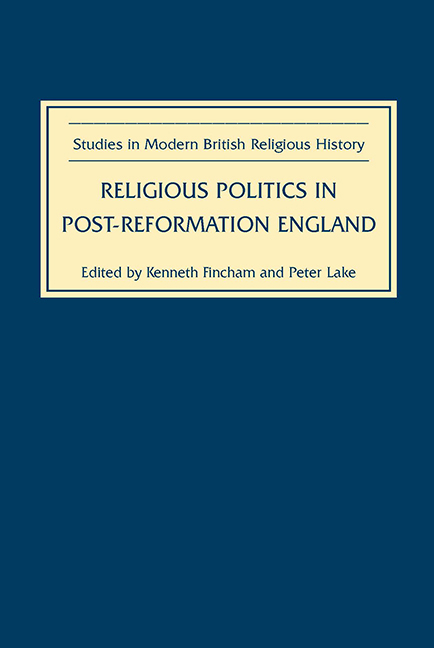Book contents
- Frontmatter
- CONTENTS
- Dedicaton
- Miscellaneous Frontmatter
- Preface
- Abbreviations
- 1 Introduction: Puritanism, Arminianism and Nicholas Tyacke
- 2 Art and Iconoclasm in Early Modern England
- 3 The Latitude of the Church of England
- 4 Joan of Contention: The Myth of the Female Pope in Early Modern England
- 5 Anti-Puritanism: The Structure of a Prejudice
- 6 The Fortunes of English Puritanism: An Elizabethan Perspective
- 7 What's in a Name? Dudley Fenner and the Peculiarities of Puritan Nomenclature
- 8 Puritan Preachers and their Patrons
- 9 New England's Reformation: ‘Wee shall be as a Citty upon a Hill, the Eies of All People are upon Us’
- 10 ‘Anglicanism’ by Stealth: The Career and Influence of John Overall
- 11 Destroyed for doing my Duty: Thomas Felton and the Penal Laws under Elizabeth and James I
- 12 Charles I and Providence
- 13 John Shawe and Edward Bowles: Civic Preachers at Peace and War
- 14 Material Evidence: The Religious Legacy of the Interregnum at St George Tombland, Norwich
- Index
- Tabula Gratulatoria
- Studies in Modern British Religious History
9 - New England's Reformation: ‘Wee shall be as a Citty upon a Hill, the Eies of All People are upon Us’
Published online by Cambridge University Press: 25 October 2017
- Frontmatter
- CONTENTS
- Dedicaton
- Miscellaneous Frontmatter
- Preface
- Abbreviations
- 1 Introduction: Puritanism, Arminianism and Nicholas Tyacke
- 2 Art and Iconoclasm in Early Modern England
- 3 The Latitude of the Church of England
- 4 Joan of Contention: The Myth of the Female Pope in Early Modern England
- 5 Anti-Puritanism: The Structure of a Prejudice
- 6 The Fortunes of English Puritanism: An Elizabethan Perspective
- 7 What's in a Name? Dudley Fenner and the Peculiarities of Puritan Nomenclature
- 8 Puritan Preachers and their Patrons
- 9 New England's Reformation: ‘Wee shall be as a Citty upon a Hill, the Eies of All People are upon Us’
- 10 ‘Anglicanism’ by Stealth: The Career and Influence of John Overall
- 11 Destroyed for doing my Duty: Thomas Felton and the Penal Laws under Elizabeth and James I
- 12 Charles I and Providence
- 13 John Shawe and Edward Bowles: Civic Preachers at Peace and War
- 14 Material Evidence: The Religious Legacy of the Interregnum at St George Tombland, Norwich
- Index
- Tabula Gratulatoria
- Studies in Modern British Religious History
Summary
In October 1640, John Winthrop, the first governor of Massachusetts, solemnly noted in his journal an act of God's providence:
About this time there fell out a thing worthy of observation. Mr. Winthrop the younger … having many books in a chamber where there was corn of divers sorts, had among them one wherein the Greek testament, the psalms and the common prayer were bound together. He found the common prayer eaten with mice, every leaf of it, and not any of the other two touched, nor any other of his books, though there were above a thousand.
The volume survives in the collections of the Massachusetts Historical Society, and I can report that the governor is guilty of overstatement: ‘less than half the pages’ of the book of common prayer are nibbled, and ‘only at the tips of the lower right-hand corners’. Despite his exaggeration of the rodent appetite for prayers, Winthrop reveals two crucial themes in the rhetoric that shaped New England's Reformation: colonists’ determination to invest everything with providential meaning; and their hostility to aspects of the English Church.
Between 12,000 and 21,000 people crossed the Atlantic in the 1630s, to take part in a unique experiment in reform. The Great Migration, as it is often called, uprooted well-established families from all over England to establish the new colonies of Massachusetts, Connecticut and New Haven. These are not the pilgrim fathers, who sailed on the Mayflower in 1620, and who were a relatively small group, despite their prominence in American mythology. The Mayflower pilgrims turned their backs on the English Church as Antichristian. Most emigrants of the 1630s claimed they did not. This may seem unlikely, given the way Winthrop's godly mice attacked the prayer book. And in fact New England presents us with a puzzle. On one hand, settlers seemed to cast off the Church of England. They not only condemned ‘remnants of popery’ back home, but set up Congregational churches – a startling innovation, soon nicknamed ‘the New England Way’, which made each local church autonomous, and restricted membership to ‘visible saints’ (people who could give a satisfactory testimony of their conversion to the assembled Church). On the other hand, colonists still loudly protested their loyalty to the English Church: for soundness of doctrine and power of religion, nowhere could match their dear native country.
- Type
- Chapter
- Information
- Religious Politics in Post-Reformation England , pp. 143 - 158Publisher: Boydell & BrewerPrint publication year: 2006



